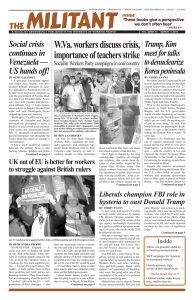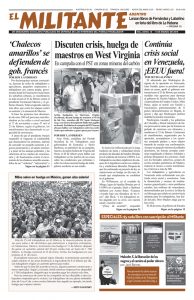President Donald Trump and North Korean leader Kim Jong Un had their second face-to-face summit Feb. 27-28 in Hanoi to continue discussions on the denuclearization of Korea. Any steps towards that end will be good for working people in Korea, the United States, Japan and more broadly.
Prior to the summit Washington’s top envoy to North Korea, Stephen Biegun, said the U.S. government would consider beginning to normalize relations with North Korea. “We didn’t say we won’t do anything until you do everything,” he said. The North Koreans are pressing for Washington to sign a declaration finally ending the Korean War it waged 70 years ago.
Massive U.S. bombings and the use of napalm destroyed much of Korea during the 1950-53 war, after Washington — with Moscow’s collusion — split the country in two and imposed the brutal Syngman Rhee dictatorship in the South. A powerful uprising by working people there was drowned in blood.
Despite the massive devastation they inflicted during the Korean War, the U.S. rulers failed to crush the workers and peasants government that in 1946 came to power in North Korea — the first military defeat for the U.S. rulers.
Ever since an armistice halted the fighting in 1953 the U.S. rulers have refused to sign a peace treaty. “To prepare the ground to ensure a Korea free of nuclear weapons, the Socialist Workers Party demands that Washington immediately sign a peace treaty ending the murderous but ultimately failed war of conquest it waged,” Steve Clark wrote Feb. 15 in a message to the people of the Democratic People’s Republic of Korea from the National Committee of the Socialist Workers Party. The message welcomed the announcement of the summit meeting.
“I don’t want to rush anyone,” President Donald Trump said going into the meeting, indicating the U.S. rulers see progress. “As long as there is no testing, we’re happy.”
Seoul, Pyongyang rail initiative
As the Washington-Pyongyang talks continue, both Korean governments have been discussing economic and social collaboration. They surveyed railway lines in the North last November in preparation for the restoration of rail links between the two countries. Officials from both governments then connected the northern and southern tracks at a ceremony Dec. 25. But they cannot re-establish rail travel — which would spur economic development — without Seoul breaching sanctions imposed by Washington.
U.S. rulers use their sanctions to try to force their will on the DPRK government. And they’ve pressed other governments and international bodies — from Beijing to the UN — successfully to follow suit. These fall with ruinous impact on working people there. The North Korean government announced Feb. 21 it would cut daily rations, that many people depend on, from 550 to 300 grams (10.6 ounces) per person because of food shortages this year.
While the imperialist enforcers of United Nations sanctions claim these “are not intended” to hit “the civilian population,” the U.N. came close to halting all its humanitarian aid to North Korea last year. The U.N. admits that over 40 percent of the North Korean population is undernourished.
The U.S. government “must lift all sanctions against the DPRK,” Clark said in the SWP message. “We demand withdrawal of U.S. troops and weaponry from Korea’s soil, skies and waters, as well as an end to the U.S. rulers’ ‘nuclear umbrella’ over South Korea and Japan.” The U.S. capitalist rulers are the only power to ever use nuclear weapons, unleashing vast destruction and death when they bombed Hiroshima and Nagasaki in 1945.
Ridding Korea of nuclear weapons would reinforce deep opposition among working people inside Japan to that country’s rulers obtaining their own nuclear arsenal. Following the first summit between Kim and Trump last year, the Japanese government halted evacuation drills it organizes in preparation for a possible North Korean nuclear attack.
Liberal opponents of Trump in the U.S. try to differentiate themselves from his Korea policy, pushing a more warlike course. A bellicose opinion piece by Nicholas Eberstadt in the New York Times Feb. 25 accused Trump of giving “one-sided concessions” to Kim. Washington should adopt “a policy of maximum pressure,” he demanded, saying, “A suffocation campaign must be enforced ruthlessly.”
But any steps to reduce military tensions in the region create better conditions for working people to organize to fight for their interests. And the prospect for increased trade and social interaction are boosting sentiment for Korean reunification.
“Korea is one!” Clark said in his message.

